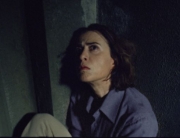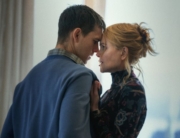The debut feature from actress Manuela Martelli (Il Futuro) is an immersive experience—absorbing, tense, and thought-provoking—framed with subtle yet striking visual panache.
Set under the brutal dictatorship of General Augusto Pinochet, Martelli’s film closely follows Carmen (Aline Küppenheim), the upper-class wife of a doctor. She is staying at her beach house in the off-season, overseeing its renovations, while family members and workers move in and out of the house. As a volunteer, she reads books to a group of blind people. This life of quiet, carefully constructed privilege is unwound and disrupted when she responds to the request of her priest, Father Sánchez (Hugo Medina), to take care of a twentysomething dissident, Elías (Nicolás Sepúlveda), who has a gunshot wound and now is in hiding. A former Red Cross nurse who wanted to study to be doctor, but was dissuaded by her father’s disapproval, Carmen treats Elías’s injury, acquiring basic medical supplies and antibiotics. Through his healing, she also ultimately becomes involved in dangerous attempts to return Elías to a safe place.
What could have been a dry political thriller is transformed into an intimate suspense story painted upon an alluring canvas. In the fashion of Dario Argento’s work from the story’s era, through Yarará Rodríguez’s vivid cinematography and Francisca Correa’s exquisite art direction, colors and dissonant textures are consistently woven into the visual landscape—pinks and oceanic blues prominently featured. The film is visually close to Carmen’s psyche. In the repetition of pink throughout, there is a metaphorical suggestion of viewing the world through rose-colored glasses.
Carmen is almost like a doll in a doll house, dressed impeccably in conservative clothing as hired workers paint a large wall in the beach house pink (meticulously mixed to the shade of a dusky sky found in an Italian travel guide). When she dons a sultry zebra print dress, it is frowned upon by her husband. (“Didn’t we decide you wouldn’t wear it anymore?”—as if referring to another time that’s no longer.) Later, she cuts it up, as if trying to expel some sort of wildness in herself. It’s an extremely appealing film to look at—its visual cues of artifice interlinked with the horrors of its historical realism.
The electronic heartbeat-like palpitations, tingly synthesizers, and sudden strands of whistling within María Portugal’s inventive score add to the atmosphere—appropriately jarring and unsettling. The work is reminiscent of Michael Small’s eerie ’70s scores like Klute and Night Moves or Goblin’s foreboding motifs in Dario Argento’s films. As Carmen’s picturesque existence unravels, shots of a verdant garden, wooded pines, or the sea can suddenly feel sinister underscored by Portugal’s music.
Martelli’s film, while meditative, moves along quickly. At times, as the secretive, risky events close in upon Carmen, the movie feels like a body snatcher film—or the horror, political paranoia thrillers of the 1970s (giallos, Don’t Look Now or movies by Alan J. Pakula). Are the phones being tapped? Is someone watching? In one taut sequence, Carmen is followed by another car with flickering headlights, and then in a hasty detour to a small, rural luncheonette, she receives suspicious glares from the male customers. Küppenheim’s excellent performance is mostly soft and inward, but it is visible when her character breaks with fear. Often these moments of panic subside and dissipate. They are not gimmicky but instead accumulate, making us intimate to Carmen’s rattled state.

















Leave A Comment